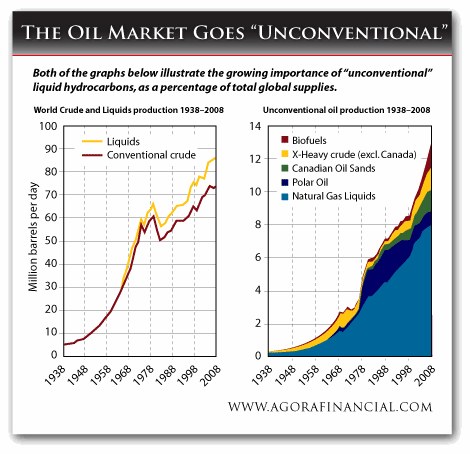After oscillating within a trading range for several weeks, the price of crude oil has recently broken out to a new recovery high. We have been firm believers of “Peak Oil” since 2003 and we were expecting this bullish resolution.
Look. Sceptics can say what they want; it does not change the fact that our world is struggling to maintain daily flow-rates. Whether you agree with us or not, the energy reality is that the supply of conventional crude oil is very close to its peak and no other fuel source can easily fill the supply gap.
Yes, various governments are now promoting alternative sources of energy and over the following years, we expect this drive to intensify. But those sources will provide too little, too late. So there remains, today, an unbelievable degree of denial when it comes to “Peak Oil”. Most people simply dismiss it as a conspiracy. Others gleefully point to alternative sources of energy, whereas some believe that the vast improvements in oil drilling technology will save the day. Do not be seduced by these delusional hopes.
Advertisement
Remember, crude oil is the lifeblood of the global economy and roughly 70 per cent of it is used to power transportation. Moreover, a vast amount of crude oil is also used up by agriculture (production of fertilisers, pesticides and irrigation systems). In fact, modern-day agriculture can be best described as a process of converting hydrocarbons into calories. Without cheap energy, the world would certainly have trouble producing half of the current food supply and the result could be far worse.
Thus, crude oil is a key ingredient in two of the most critical processes which make modern life possible - transportation and agriculture. And shortages of this vital natural resource will result in extreme pain. In the initial stages, the price of crude oil will rise remorselessly and eventually, we will face rationing.
Now that we have established the importance of crude oil, we will explain why new drilling technology and alternative sources of energy will not make this problem go away.
First, as far as drilling technology is concerned, it is worth noting that America is home to the best oilfield technology on this planet. However, its oil production peaked in the early 1970s and has been in a relentless decline. Furthermore, apart from America, other technologically advanced nations in the world have also failed in maintaining their daily flow-rates. For instance, after exporting crude oil for over two decades, Britain is now a net importer and its production is in a state of permanent decline. Hard data confirms that two of the most advanced countries in the world now live in a post “Peak Oil” era, so what are the odds that other less fortunate nations will succeed in averting “Peak Oil”?
Second, as far as alternative sources of energy are concerned, they represent a drop in the energy ocean and will not be able to offset the depletion in crude oil. Despite all the euphoria surrounding renewable energy, the “sources” like ethanol and solar panels are net energy losers. In other words, it takes more energy to produce ethanol and solar panels than the energy you obtain from them. For sure, hybrid and electric cars will help us to some degree but you must keep in mind the fact that electricity is not a source of energy; it is a carrier of energy. Even if electric cars become popular, how will we generate sufficient electricity?
Elsewhere in the alternative energy patch, a lot of hopes currently rest on unconventional sources of oil (especially tar sands and shale oil). Once again, this optimism is misplaced, as the increased supply from the unconventional sources will not even make a dent in the overall energy picture. The nearby chart confirms that our world currently produces roughly 85 million barrels per day of total liquids and out of this gigantic sum, only 13 million barrels per day of oil is derived from unconventional sources. So, when the production of conventional crude oil finally declines due to “Peak Oil”, it is extremely improbable that unconventional supply will be able to rise to the challenge.
Advertisement

Source: Oilwatch Monthly, IEA and EIA
As far as Canada's tar sands are concerned, Alberta currently produces roughly 1.4 million barrels of oil per day and under the best case scenario, this figure is expected to rise to just 3.5 million barrels per day by 2020. To complicate matters even further, the tar sands require huge amounts of water and natural gas. In addition to this, the mining procedure is extremely polluting. For example, the process of extracting “oil” from bitumen releases at least three times the amount of carbon dioxide emissions as regular oil production. Accordingly, we have no doubt in our minds that Canada's tar is not the Holy Grail.
Discuss in our Forums
See what other readers are saying about this article!
Click here to read & post comments.
3 posts so far.